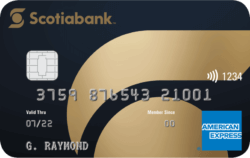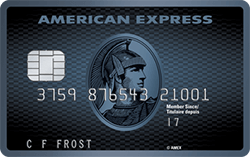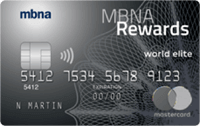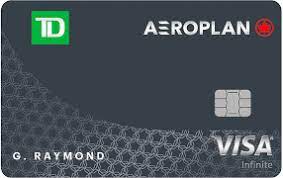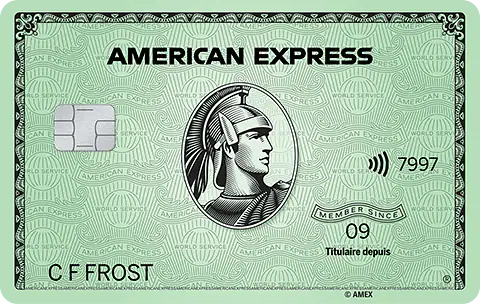To be one of the best travel credit cards in Canada on our list, the card must combine strong earn rates with perks like lounge access, no foreign transaction fees and travel insurance coverage. We’ve compiled this list of the top cards in this category to help you get started.
Best travel credit cards in Canada

Scotiabank Gold American Express Card

American Express Cobalt Card

MBNA Rewards World Elite Mastercard
MoneySense is an award-winning magazine, helping Canadians navigate money matters since 1999. Our editorial team of trained journalists works closely with leading personal finance experts in Canada. To help you find the best financial products, we compare the offerings from over 12 major institutions, including banks, credit unions and card issuers. Learn more about our advertising and trusted partners.
Popular travel credit cards in Canada
Compare your travel card options with our interactive tool and filter credit cards based on rewards value, annual fees, income requirements and more. Use this tool to compare credit card options, or keep scrolling for our editors’ top picks.
MoneySense award winners
We break down the pros and cons of our gold, silver and bronze-winning travel credit card picks. Scroll further for other good options, including the best airline credit card and best no-fee alternative.
MoneySense editors apply their credit card expertise and knowledge of Canadians’ financial goals to come up with selection criteria that matches the needs of the intended cardholder. For travel credit cards, your return on spending is a key consideration, because it represents the value of the points you earn with every purchase. We consider annual fees and eligibility criteria (for student credit cards), perks and insurance (for premium credit cards) and other factors, specific to each category. The addition of links from affiliate partners has no bearing on the results in this ranking. Read more about the MoneySense selection process and about how MoneySense makes money.
Gold: Scotiabank Gold American Express
At a glance: The Scotiabank Gold American Express is Canada’s best all-round travel credit card. It comes with unbeatable rewards and benefits, including up to 6 points per dollar on groceries and 5 points on dining, food delivery and entertainment—plus the ability to redeem points retroactively for purchases made within the past 12 months. With comprehensive travel insurance, no foreign transaction fees and exclusive American Express perks, this card is the perfect companion for both everyday spending and your next adventure.
Scotiabank Gold American Express
Annual fee: $120
- 6 points per $1 at Sobeys-affiliated stores
- 5 points per $1 on dining, entertainment and groceries
- 3 points per $1 on gas, transit and streaming
- 1 point per $1 on everything else
- Pay no FX fees on foreign purchases
Welcome offer: Earn up to $780 in value in the first 12 months, including up to 40,000 bonus Scene+ points. Offer ends July 1, 2025.
Card details
| Interest rates | 20.99% on purchases, 22.99% on cash advances, 22.99% on balance transfers |
| Income required | $12,000 per year |
| Credit score | 725 or higher |
| Point value | 1 Scene+ point = $0.01 when redeemed for travel on any airline or hotel (including Airbnbs). |
Pros
- Straightforward redemptions: When you book through Scene+ Travel, Powered by Expedia, you can redeem in increments of 100 points (valued at $1). There are no complicated rules or exceptions to manage.
- Redemption window: Through the apply points to travel option, you can redeem your points retroactively for up to 12 months after you make a travel purchase.
- Comprehensive insurance benefits: This credit card offers robust travel insurance coverage, including $1 million in medical travel insurance, which is valid for up to 25 days—one of the longest coverage periods available on Canadian cards.
- No foreign transaction fees: Enjoy savings on foreign currency transactions while traveling or shopping online, as this card waives the usual 2.5% foreign transaction fee.
Cons
- Fixed point redemption value: While earning rates are high, points are always valued at $0.01 and cannot be transferred to airline frequent flyer programs, unlike some other cards.
- Limited acceptance: American Express is not as widely accepted in Canada compared to Visa and Mastercard, which may limit its use for some Canadians. For example, Loblaw-owned grocery stores don’t accept Amex. Depending on where you’re travelling, Amex acceptance may be even more limited.
Silver: American Express Cobalt
At a glance: With outstanding earn rates in broadly-defined, popular spending categories, the American Express Cobalt card is a travel rewards beast. Points are easy to redeem and flexible, and you can increase their value by transferring them to other travel loyalty programs. It comes with a comprehensive insurance package.
American Express Cobalt
Annual fee: $156
- 5 points per $1 on dining and groceries
- 3 points per $1 on streaming services
- 2 points per $1 on transit and gas
- 1 point per $1 on all other purchases
Welcome offer: Earn 1,250 points for each month you spend $750, up to a maximum of 15,000 points.
Card details
| Interest rates | 21.99% on purchases, 21.99% on cash advances |
| Income required | None specified |
| Credit score | 725 or higher |
| Point value | 1 Amex Membership Rewards point = $0.01 when redeemed with the Flexible Points Travel Program, $0.015 on average with the Fixed Points Travel Program, and up to $0.02 with airline points transfers. |
Pros
- High earn rates: Get some of the highest rates around, and no spending limits on categories, except for a reward spend cap of $2,500 per month on food and groceries.
- Broadly defined categories: Get boosted points on some spend categories for your purchases. For example, “eats and drinks” includes everything from grocery stores to coffee shops and food delivery.
- Flexible redemptions: Amex Membership Rewards points are pretty lucrative. Redeem the simple way at a flat rate of 10,000 points for $10 towards any travel expense or boost point values by using Amex’s Fixed Point chart or transferring points to another program like Aeroplan.
Cons
- Reward cap on food: A $2,500-per-month cap on food and groceries spends.
- Limited acceptance: Although American Express can be used at tens of thousands of businesses across the country, it’s not as widely accepted as Visa or Mastercard at home and abroad.
- High annual fee: The $12.99 monthly fee comes to a total of $155.88 per year—a bit more than the $120 charged by comparable cards in Canada.
- No trip cancellation coverage: The travel insurance does not cover a cancelled trip.
Bronze: MBNA Rewards World Elite Mastercard
At a glance: You’re sure to rack up points quickly with the MBNA Rewards World Elite Mastercard. In addition to earning 5 MBNA Rewards points per $1 spent across five categories—restaurant, grocery, digital media, membership and household utility purchases—cardholders get an annual birthday bonus of 10% of the points earned in the last 12 months. Happy birthday to you!
MBNA Rewards World Elite Mastercard
Annual fee: $120
- 5 points per $1 on eligible restaurant, grocery, digital media, membership and household utility purchases until $50,000 is spent annually in the applicable category
- 1 point for every $1 on all other eligible purchases
Welcome offer: earn 20,000 bonus points (approximately $165 in cash back value) after you make $2,000 or more in eligible purchases within the first 90 days. (Not available for residents of Quebec.)
Card details
| Interest rates | 19.99% on purchases, cash advances 24.99% on cash advances, 22.99% on balance transfers |
| Income required | $80,000 per year |
| Credit score | 660 or higher |
| Point value | 1 MBNA Rewards point = $0.01 when redeemed for travel. |
Pros
- High earn rates: One the highest rates of return, with a whopping 5 points per $1 spent across five spending categories.
- Annual birthday bonus: Every year, get a bonus equal to 10% of the points earned within the last 12 months (up to a maximum of 15,000 points).
Cons
- Travel redemption option: For travel purchases, points can only be redeemed through the MBNA Rewards platform.
- High income requirement: As with other World Elite Mastercards, the minimum annual income needed to qualify is quite high.
Best airline credit card: TD Aeroplan Visa Infinite Card
At a glance: The TD Aeroplan Visa Infinite tops our list of best Aeroplan credit cards in Canada for its easy redemption process and extras like the $100 Nexus fee rebate. Plus, if you frequently spend on Uber rides and deliveries and/or are a regular at Starbucks, you could stretch your rewards even further with this credit card.
TD Aeroplan Visa Infinite Card
Annual fee: $139 (waived first year)
- 1.5 Aeroplan points per $1 on gas, groceries and purchases
- 1.5 Aeroplan points per $1 on purchases made directly through Air Canada (including vacation packages)
- 1 point per $1 on all other purchases
Welcome offer: Earn up to $1,500 in value, including up to 50,000 Aeroplan points and no annual fee for the first year. Conditions apply. Account must be approved by Jan. 6, 2025.
Card details
| Interest rates | 20.99% on purchases, 22.99% on cash advances, 22.99% on balance transfers |
| Income required | Personal income of $60,000 or household income of $100,000 |
| Credit score | 680 or higher (recommended) |
| Point value | Aeroplan points are worth $0.02 on average. |
Pros
- Free checked bags for up to nine people: Card holders and up to eight companions travelling on the same reservation get their first checked bag free on Air Canada flights.
- Flexible redemptions: Redeem your points for Air Canada flights or on a dozen Star Alliance partners, like Lufthansa and United.
- Nexus fee rebate: Get valuable extras like a $100 rebate every two years.
- Competitive insurance package: Includes emergency medical travel coverage for longer than some competitors (21 days, or 4 days for those 65 and older)
Cons
- Not the best card to maximize points: Using the Amex Cobalt and transferring points at a 1:1 ratio is a better option if you’re looking for the best way to get as many Aeroplan points as you can.
- Complicated rewards program: Aeroplan is a dynamic chart-based program, meaning point values fluctuate based on where and when you’re flying, so it may not be the right program for those wanting simplicity with redeeming and travel planning.
- High annual fee: A slightly higher fee than some other cards in its category.
Best no-fee travel credit card: American Express Green Card
At a glance: One of our best no-fee cards in Canada, the American Express Green Card earns points on your everyday spending, which can be redeem for card statement credits, gifts cards, merchandise and/or travel. Or you can transfer them at a 1:1 ratio to other frequent flyer or rewards programs. This is notable because by transferring to a program like Aeroplan, you can boost the value of your points significantly.
American Express Green Card
Annual fee: $0
- 1 point for every $1 spent on all purchases
- 1 additional point for every $1 spent on hotel or car bookings made on americanexpress.ca.
Welcome offer: earn 10,000 Membership Rewards points when you charge $1,000 in purchases to your card in the first three months of cardmembership.
Card details
| Interest rates | 21.99% on purchases, 21.99% on cash advances |
| Income required | None specified |
| Credit score | 725 or higher |
| Point value | 1 Amex Membership Rewards point = $0.01 when redeemed with the Flexible Points Travel Program, $0.015 on average with the Fixed Points Travel Program, and up to $0.02 with airline points transfers. . |
Pros
- High earning: Earn a flat rate of 1 point per dollar on all purchases with no spending limits, and double for hotel or car rental bookings made through Amex Travel Online.
- Transfer points to increase value: When you transfer points to another program, like Aeroplan, you can double their value to 2 cents apiece. A 1.5% to 2% return on spending is rare for a no-fee card.
- Amex Membership perks: Take advantage of curated dining, shopping, and entertainment events with rewards like Experiences, and get advance access to tickets with Front of the Line.
Cons
- No travel insurance or perks: It comes with no insurance or perks like lounge or WiFi access included, but that’s not unusual for a no-fee card.
- Limited acceptance: American Express cards are accepted at many places at home and abroad, but there are limitations—mostly in the grocery sector. In Canada, you can’t use Amex at Costco and Loblaw-banner stores.
Frequently asked questions
Yes, getting a credit card for travelling can be a great idea, especially for Canadians who want to maximize travel rewards and enjoy added benefits. Many travel credit cards offer excellent perks like rewards on spending, travel insurance coverage and no foreign transaction fees, all of which can save you money and provide peace of mind when travelling abroad. For instance, the Scotiabank Gold American Express offers high rewards rates on groceries, dining and entertainment, along with comprehensive travel insurance, including medical coverage for up to 25 days.
The most common travel points programs have either a consistent value or a chart-based system. With consistent rewards programs, the value of the points is always the same. For example, BMO Ascend World Elite users earn BMO Rewards points, for which 150 points equals $1 in travel rewards. Point values in chart-based programs depend on variables like the destination, ticket price and time of travel. Points redemption for the TD Aeroplan Visa Infinite are based on Aeroplan’s dynamic redemption chart. Consistent points programs are ideal if you want a simple redemption process. Chart-based programs are more complex, but potentially more valuable.
Some travel rewards points can expire after a certain period of inactivity, while others do not. For example, Aeroplan points expire after 18 months of inactivity, and Marriott Bonvoy points expire after 24 months, while WestJet dollars generally don’t expire, unless they were earned during certain promotions or other circumstances (read the fine print to be sure). To avoid having your points expire, you can book hotels with your points, buy products through the loyalty program’s store, transfer points from another program or to a family member, in some cases, and more.
Different types of travel credit cards
Generic travel rewards credit cards
Some credit cards in Canada offer you the ability to earn rewards on everyday purchases and other purchase categories, which can be redeemed towards a wide variety of things, including travel. This means you are not necessarily limited to booking through certain airlines when redeeming your points on flights. You may also be able to transfer your credit card points to an airline rewards program, such as with the American Express Cobalt.
Airline rewards credit cards
Some travel credit cards offer rewards with specific airlines where your points’ redemption values may vary, such as the TD Aeroplan Visa Infinite credit card. When you accumulate enough points, you can book a flight or vacation package with affiliated airlines like WestJet or Air Canada. Keep in mind though that the value of your points can depend on the date of your flight and your destination.
Hotel rewards credit cards
Hotel rewards credit cards offer you the ability to redeem your points towards a hotel stay, and to earn points when you book at affiliated hotels like Marriott or Delta, or earn perks such as room upgrades or free breakfasts when you book eligible hotel stays. If you frequently book hotels for work or travel, consider a hotel rewards credit card like the Marriott Bonvoy American Express.
Deciding between ravel credit card features
When choosing a travel credit card, there are many valuable perks beyond rewards points and booking redemption options, including flights, hotels and car rentals. Here are some benefits to look out for before applying for a travel credit card.
- Travel insurance coverage: You can save thousands in the event of medical emergencies, trip interruptions or lost baggage. Most credit card travel insurance programs cover short trips (up to 15 days) with options for extended protection. Coverage is often reduced for those over 65, so it’s important to verify whether the card’s insurance limits align with your travel plans and age. (Read about how to know if your credit card comes with enough travel insurance coverage.)
- Airport lounge access: Enjoy a relaxing pre-flight experience with airport lounge access, a valuable perk offered by many premium travel cards. Some cards include free or discounted passes to lounges through programs like Priority Pass, Visa Airport Companion Program and Dragon Pass. Lounges provide amenities like complimentary snacks, beverages, Wi-Fi and comfortable seating areas. (Read more about credit cards with airport lounge access.)
- Hotel discounts and upgrades: Many travel credit cards offer exclusive discounts or perks when booking with certain hotel chains, like Marriott, Hilton or boutique chains. Benefits can include discounts on standard rates, room upgrades or even free nights after a certain number of bookings. These discounts and perks can make your travels more luxurious while saving you money.
- No foreign transaction (FX) fees: FX fees can add up quickly, especially when traveling frequently or making purchases in different currencies. Some travel credit cards waive these fees (typically around 2.5%) or lower them, saving you money on each transaction. (Read more about no foreign transaction fee credit cards.)
- Roadside assistance coverage: If you’re planning a road trip, roadside assistance can offer peace of mind in case of unexpected issues, like a flat tire, empty gas tank or a towing emergency. Many travel credit cards offer such perks for free or at a discounted rate. (Read more on credit cards with roadside assistance coverage.)
Rental car insurance: Rental insurance can protect you from high out-of-pocket expenses in case of collision or loss damages to rented vehicles. Many travel credit cards offer coverage for rental cars, which could mean you can skip the rental company’s costly insurance add-ons. Make sure to confirm the extent of the coverage and exclusions, as terms vary widely. (Read more about car rental insurance coverage with credit cards.)
What travel points program is best?
Not all travel reward programs are created equal. So how do you choose the right one for you?
As noted above, it’s important to understand that travel rewards programs can be broken down into two basic types: Consistent and chart-based.
It’s worth noting that in rare cases, like the American Express Membership Rewards Program, you might get to choose to redeem points for travel based on either a consistent system or as a chart-based system.
Many of the big banks in Canada offer consistent points travel reward programs. They’re aimed at people who want to operate within a simple program with an easy-to-understand redemption process. So, people who dislike complicated programs will appreciate consistent rewards.
Chart-based programs can be considerably more complicated—but also potentially more valuable in rewards. Since the number of points needed to redeem for a flight isn’t consistent, using the rewards chart strategically can help you stretch the value of your points and net a higher return when flying on certain routes, and even for booking premium seats or business class. These programs are more popular with personal finance enthusiasts and left-brain thinkers.
Compare travel credit cards rewards points values
Here’s how the best travel reward programs stack up against each other.
| Rewards program | Point value |
|---|---|
| Aeroplan | 1 Aeroplan point is worth $0.02 on average. |
| Air Miles | 1 Air Mile is worth approximately $0.121 in travel rewards |
| American Express Flexible Points Program | 1 American Express point is worth $0.01 in travel rewards |
| American Express Fixed Points program | 1 American Express point is worth $0.01 in travel rewards |
| BMO Rewards | 1 BMO Rewards point is worth 0.7 of a cent in travel rewards |
| Marriott Bonvoy | 1 Marriott Bonvoy point is worth $0.0117 on average when redeemed for eligible flights or hotel stays |
| MBNA Rewards | 1 point MBNA Rewards point is worth $0.01 in travel rewards |
| National Bank | 1 National Bank point is worth $0.01 in travel rewards |
| RBC Avion Rewards | 1 Avion Rewards point is worth $0.01 in travel rewards |
| RBC Avion – Air Travel Redemption Schedule | 1 Avion point is worth $0.01 when redeemed for flights or hotels |
| Scene Rewards | 1 Scene Rewards point is worth $0.01 in travel rewards |
| TD Rewards | 1 TD Rewards point is worth 0.5 of a cent in travel rewards booked via Expedia For TD |
| WestJet Dollars | 1% in WestJet Dollars is worth $0.01 in travel rewards |
How many travel rewards points do you need for a flight?
Let’s breakdown the value of a travel reward for multiple travel reward programs in Canada.
How many Aeroplan points you need for a flight?
Aeroplan’s chart system uses Miles to measure the minimum point redemptions. For short flights within North America, you’d need at least 6,000-22,500 points for an Economy flight, 35,000 to 70,000 points for North America and Atlantic zones, and so on.
How many Air Mile Dream miles you need for a flight?
Air Miles does not have a set flight chart. The number of Air Miles Dream miles needed for a free flight varies significantly as pricing is based on demand and what carrier and class you select. On average, 1 Air Mile point is worth 12.1 cents in travel rewards.
How many Avion points you need for a flight?
Premium Avion cardholders need at least 15,000 points for a flight within or near your province or territory, at least 35,000 points for a flight within North America, 65,000 points for a flight to Europe and 100,000 points for other destinations around the globe.
How many Amex points you need for a flight
Using the American Express fixed points program, you’d need at least 15,000 points for a short flight within North America, 20,000 points for a flight from a Canadian province or territory to a nearby U.S. State, 40,000 points for a longer North American route, 50,000 points for a vacation destination and at least 60,000 points for Europe or 100,000 points for other continents.
How many Scene+ points you need for a flight?
1 point is worth 1 cent. For a $300 airline ticket, you’d need 300,000 Scene+ points.
How many BMO Rewards points you need for a flight?
You can redeem your points for a statement credit towards flights. 1 BMO Rewards point is worth 0.7 of a cent in travel rewards.
How many TD points you need for a flight?
You need a minimum of 200 points for a redemption through Expedia for TD. 1 TD Rewards point is worth 0.5 cents in travel rewards.
How many MBNA rewards points you need for a flight?
You can redeem a minimum of 10,000 points for a $100 statement credit on travel.
